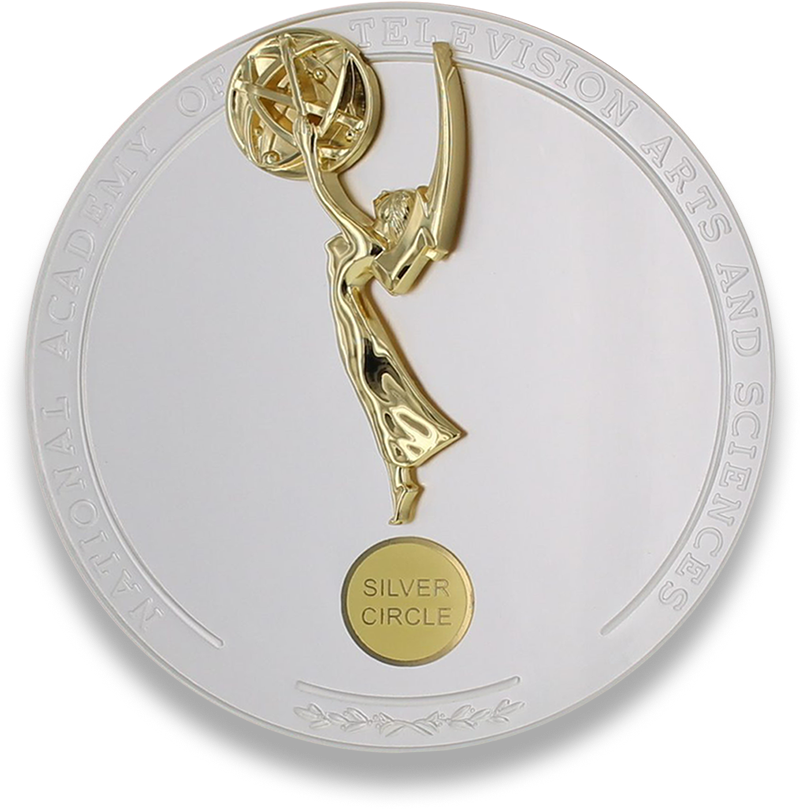
CHICAGO / MIDWEST
Honorees
2001
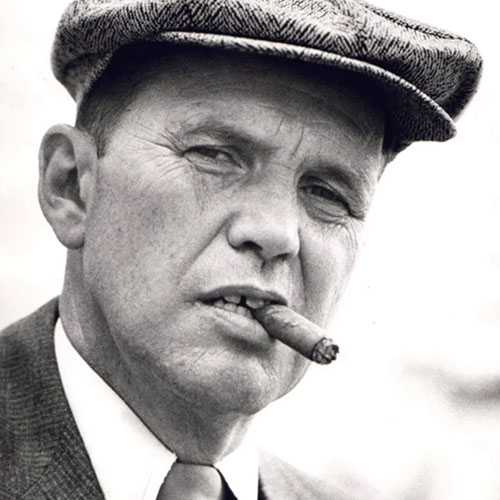
John Drummond
Legendary reporter John “Bulldog” Drummond worked at CBS 2 Chicago from 1969 until 1997. Known mostly for his crime coverage, especially of the Chicago Outfit, Drummond is a walking encyclopedia of Chicago mob history. Since retiring, Drummond has written two books about some of the characters and capers he has covered. He has also consulted on a few documentaries and has been back on the air at CBS 2 several times — although these days it’s mostly when a member of the Oufit passes away or on the anniversary of a grisly murder.
An avid golfer, Drummond recently told The Chicago Ambassador that he was very upset with the early cold this year, as it likely will keep him off the links until the spring. In the meantime, when he’s not golfing or visiting with his kids or grandchildren, Drummond still stays in touch with many of his sources and follows the exploits of characters he’s covered.
From
https://thechicagoambassador.wordpress.com/2014/12/02/legendary-newsman-john-bulldog-drummond-may-be-retired-but-hes-still-pounding-the-pavement/
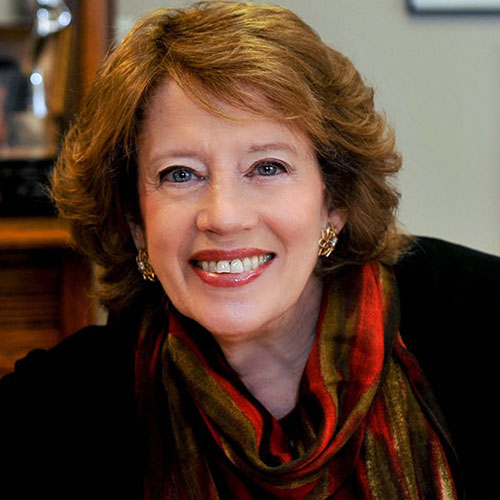
Thea Flaum
In 1976, Thea Flaum created a television show that redefined the way an entire generation learned about the movies. She put two Chicago film critics, Gene Siskel and Roger Ebert, in a movie theater balcony, and a new television format was born — along with two unlikely celebrities. A few years later, Thea was named Executive Producer for National (PBS) cultural programs for WTTW / Chicago. She created the first national parenting series, Look at Me, hosted by Phil Donahue. She was responsible for the Soundstage music series and for negotiating and producing productions with MTV and HBO.
In 1984, Thea formed an independent production company based in Chicago. The company focuses on family programming — creating developing and producing dramas, documentaries specials, series and pilots, for network, cable, syndication and public television.
Thea’s work has earned her nine Emmy® Awards, 10 international film awards, and the American Bar Association’s “Silver Gavel” award, the “Best in Media” award from the National Council for Children’s Rights, a Cine “Golden Eagle,” and a “Golden Apple.” In 1993, she was named Chicago’s “Best Producer” by Screen Magazine. In 1996, she received the Governor’s Award from the Chicago/Midwest Chapter of the National Academy of Television Arts & Sciences.
From https://www.thechicagonetwork.org/members/thea-flaum/
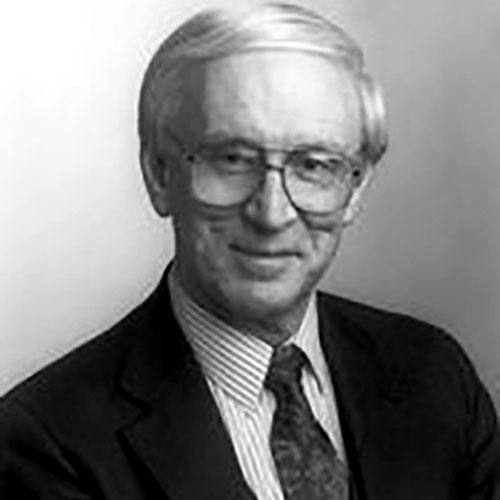
Allen Hall
Al Hall spent more than three decades producing and directing that clown-based classic of Chicago children's TV, The Bozo Show.
Mr. Hall knew his legacy would be the show built around the red-headed clown.
"In Chicago there are probably four icons," he said in a WGN-TV interview, "Mrs. (O'Leary's) cow, the Cubs, a mayor named Daley and Bozo the Clown."
At its height, The Bozo Show had a 10-year wait for tickets. To get kids into the studio before childhood ended, parents requested tickets while their offspring were still in the womb.
Mr. Hall did everything on the program, which aired live in its early years. He urged performers to slow down or speed up to fill airtime. He gamely endured on-camera cream-pie onslaughts.
"You'd have to hang a bell on Al Hall to keep track of him," said Joey D'Auria, who joined the long-running show in 1984 and starred as Bozo until the program's cancellation in 2001 "He'd either be in the control booth checking on things or down on the floor if there were guests. He'd be greeting them, prepping them."
Mr. Hall occasionally decided to give a child a second chance at the Grand Prize Game, where kids tried to land balls in a series of buckets with ever-bigger prizes. Bucket No. 6 was the Holy Grail. Little did Mr. Hall know the consternation this would cause in bars throughout Chicago.
"I got bomb threats," he recalled. "They would bet on the Grand Prize Game."
Mr. Hall earned a master's degree in TV production from Iowa State University and joined WGN in 1961, a year after The Bozo Show began.
During his 40-year career at WGN, Mr. Hall also directed baby boomer classics like the Ray Rayner Show and Romper Room." He produced or directed broadcasts of telethons, parades and Bulls and Blackhawks games. He won seven Emmy® Awards.
Hall passed away on September 6, 2011.
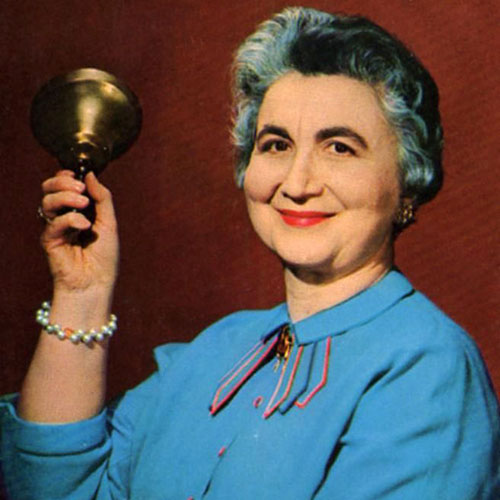
Dr. Frances Horwich
Frances Horwich was loved by parents and children alike for her television show, Ding Dong School. She served in a variety of posts, from supervising nursery schools for the Works Progress Administration to dean of education at Pestalozzi Froebel Teacher’s College of Chicago to professor of education at the University of North Carolina. On her show, Ding Dong School, Horwich showed millions of children how to finger paint, grow plants, and do craft projects with household objects like pipe cleaners and paper plates. The show earned Horwich both a Peabody and Woman of the Year in Education Award in 1953, as well as the National Association for Better Radio and Television Award. Horwich also wrote 27 Ding Dong SchoolSchool books and two books for parents.
<br
“I’m your school bell—ding, dong, ding! Boys and girls all hear me ring.” So began the daily telecasts of Ding Dong School the popular children’s television show of the mid–1950s. “Miss Frances,” the school’s beloved teacher, rang her handbell at the start of each show and invited her audience of millions to join her for the day’s activities.
Horwich was the recipient of some sixty awards and honors for her work on Ding Dong School, most notably the George Foster Peabody Award in 1953. In the same year the Associated Press named her Woman of the Year in Education. She earned the National Association for Better Radio and Television Award in 1953 and 1954. Horwich died on July 22, 2001, in Scottsdale, Arizona.
From https://jwa.org/encyclopedia/article/horwich-frances
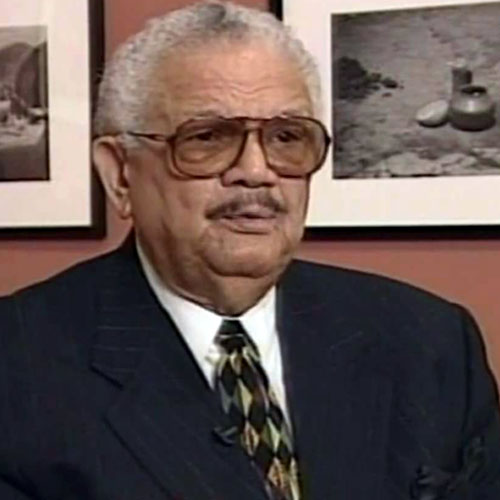
Vernon Jarrett
Born on June 19, 1918, in Tennessee, Vernon Jarrett was one of the nation's most prominent commentators on race relations and African American history within the United States. Newspaper, television and radio broadcasts have all been forums for his insights. Jarrett began his journalism career at the Chicago Defender during the 1940's and later worked for the Associated Negro Press before making the transition to radio in 1948. For the next three years, Jarrett and composer Oscar Brown, Jr. produced "Negro Newsfront", the nation's first daily radio newscast created by African Americans.
In 1970, Jarrett became the first African American syndicated columnist for the Chicago Tribune. He used his editorial voice as a forum for commentary on the social and economic trends affecting African Americans, as well as the global concerns of pan-African politics. During this period, Jarrett served as host on Chicago's WLS-ABC TV, where he produced nearly two thousand television broadcasts. In 1983, Jarrett left the Tribune and began writing for the Chicago Sun-Times, where he continued his tradition of political and social commentary, which has always been firmly grounded in the African American experience.
In 1977, Jarrett created the NAACP-sponsored ACT-SO program. An acronym for "Afro-Academic, Cultural, Technological, and Scientific Olympics", ACT-SO is an enrichment program for exceptional African American students nationwide. Through the program, over $1,000,000 in computers, scholarships and books have been awarded to top-ranking students, who are recognized and honored each year during ACT-SO's national television special. To date, hundreds of students across the United States have participated in the annual event.
Jarrett also became a columnist for the New York Times' New American News Syndicate and his social commentary could be heard during "The Jarrett Journal", a news show broadcast on WVON-AM, Chicago's only African American-owned radio station. He was also a member of the editorial board of the NAACP's ninety year-old magazine, The Crisis, which was created by W. E. B. Du Bois. Jarrett's outstanding journalistic efforts have earned him numerous honors and awards, including his being the first recipient of the NAACP's James Weldon Johnson Achievement Award and his 1998 induction into the National Literary Hall of Fame at the University of Chicago's Gwendolyn Brooks Center. Jarrett passed away on May 23, 2004.
From: https://www.thehistorymakers.org/biography/vernon-jarrett-39
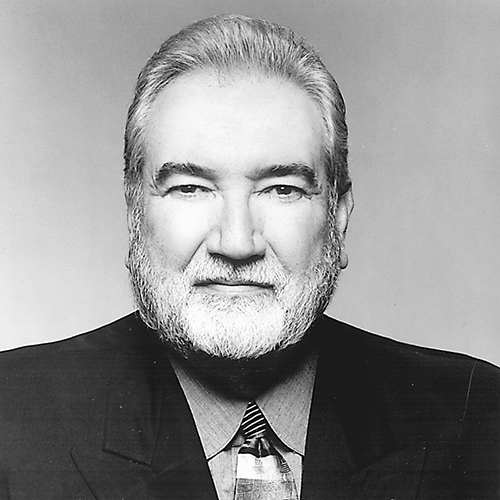
Dick Kay
Dick Kay was a no-nonsense, incisive inquisitor who had one of the longest political reporting careers in Chicago.
Mr. Kay had a stentorian voice that sliced through the noise at crime scenes and news conferences like a bass baritone in an opera. It seemed to command answers, even from those who might have preferred to slink away.
Mr. Kay worked for WMAQ-Channel 5 for 38 years. Hired as a writer in 1968, within months, he was covering one of the most tumultuous political stories of the century.
“They sent me out on the street, a green kid. The Democratic Convention, in the middle of it! I was stunned,” he once said in an interview with the Chicago Sun-Times.
He began appearing on air two years later, ultimately as political editor.
After retiring in 2006, he started hosting “Dick Kay: Back on the Beat” on WCPT-AM.
He grew up in Dellrose, Tennessee, a self-described “country boy” born in a log cabin. He was just 3 when his sharecropper-father died. His mother was a seamstress or cook all her life, he told the Sun-Times. At 14, he dropped out of school so he could make money digging ditches, picking cotton and washing dishes.
At 16, he joined the Navy, serving on the USS Magoffin as a radio man, working with amphibious landing craft, and got his high school equivalency diploma.
He went on to Bradley University, where he got a bachelor’s degree in speech education and performed in summer stock with the Peoria Players. He worked his way through college delivering mail.
“He was a man that came from nothing, I mean nothing,” his son Steve Snodgrass said.
His break in broadcasting came with a job at a radio station in Pekin. He moved on to a job in Peoria, where he met his future wife Kay on a blind date.
Her name inspired his new surname, thought to be better for a broadcasting career. He’d been Richard Snodgrass but changed it to Dick Kay. His nickname was “Doogie.”
After Peoria, he was the news director at WFRV-TV in Green Bay, Wisconsin, in 1965, where one of his favorite stories was a 30-minute interview with Richard Nixon, then running for president.
After Green Bay, he landed at Channel 5, where, in addition to being “a student of politics,” he “was a bulldog,” said Jim Stricklin, his longtime photographer there. Stricklin recalled a time fire Cmsr. Robert J. Quinn confronted Mr. Kay in a City Hall elevator over a story he didn’t like. “Dick never backed down, never,” Strickin said.
Mr. Kay also was a union steward and later Chicago president and a national vice president of what’s now SAG-AFTRA — the Screen Actors Guild and the American Federation of Television and Radio Artists. He was proud of his work to curb “no-compete” limits that keep broadcast talents from changing stations.
“He was absolutely fearless about going toe-to-toe with management,” former WMAQ colleague Joan Esposito said. “People who worked with him adored and respected him.”
He loved going out on his sailboat. He played the harmonica and enjoyed country music, especially Hank Williams, Esposito said.
She said, about once a week, “He and his buddies would go to this cigar store, sit around and talk” while enjoying a good cigar.
Mr. Kay received the Peabody Award — one of broadcast journalism’s highest honors — for a 1984 investigation of the Illinois Legislature called “Political Parasites.” His work also garnered a National Headliner Award. He’d won 11 local Emmy® Awards when he was inducted in 2001 into the Silver Circle of the Chicago/Midwest Chapter of the National Academy of Television Arts & Sciences.
After retiring, he worked for then-Gov. Rod Blagojevich, promoting his healthcare plan.
He loved TV news but warned newcomers about the “grind.”
“It’s glamorous until you’re out there on the expressway doing a traffic report in 20 degree below zero with a blizzard,” he said in a 2012 interview, “or until you’re covering a tragedy like an airplane crash.” Mr. Kay died on May 13, 2021.
From https://chicago.suntimes.com/2021/5/13/22432511/dick-kay-political-reporter-wmaq-tv-obituary
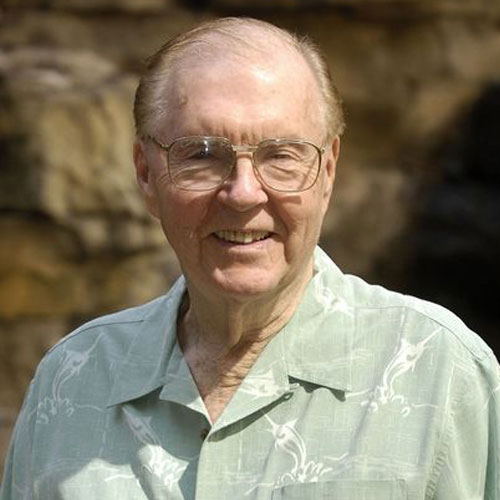
Jack Taylor
Jack Taylor (born December 1928) is an American broadcaster who is the host of the Jack Taylor Show on 1220 WKRS Radio in the Chicago area.
His career in broadcasting began in the Armed Forces Radio, then took him to WINN in Louisville, Kentucky, and in 1950, to WCFL in Chicago. He moved to WBBM Radio Chicago in 1954, and then to his broadcast home for many years, WGN-TV, Chicago in 1958. Jack Taylor was an anchor, host, and announcer on WGN-TV, and became a financial news anchor, commentator and interviewer for many years on “The Stock Market Observer” on Chicago's WCIU-TV channel 26. He moved to WebFN, a 24-hour financial news network, before eventually returning to radio.
He has spent much of his career in radio, including Armed Forces Radio Service while in the Army, WINN, ABC Louisville, KMBC CBS in Kansas City, WCFL Chicago, WBBM Radio Chicago and FM 100 Chicago. In the course of his career, he has conducted more than 55,000 interviews with guests ranging from Marlon Brando to Presidents Ford and Reagan.
Jack Taylor and his career are notable because of his longevity and ubiquity across different broadcast media. Taylor passed away in February 2023 at age 94.
From: https://en.wikipedia.org/wiki/Jack_Taylor_(journalist)